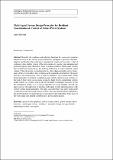Multi-Agent System Design Principles for Resilient Coordination & Control of Future Power Systems
Author(s)
Farid, Amro M.
Download40903_2015_13_ReferencePDF.pdf (346.3Kb)
PUBLISHER_POLICY
Publisher Policy
Article is made available in accordance with the publisher's policy and may be subject to US copyright law. Please refer to the publisher's site for terms of use.
Terms of use
Metadata
Show full item recordAbstract
Recently, the academic and industrial literature has coalesced around an enhanced vision of the electric power grid that is intelligent, responsive, dynamic, adaptive and flexible. One particularly emphasized “smart-grid” property is that of resilience where healthy regions of the grid continue to operate while disrupted and perturbed regions bring themselves back to normal operation. Multi-agent systems have recently been proposed as a key enabling technology for such a resilient control scheme. While the power system literature has often addressed multi-agent systems, many of these works did not have resilience as the central design intention. This paper now has a two-fold purpose. First, it seeks to identify a set of multi-agent system design principles for resilient coordination and control of future power systems. To that end, it draws upon an axiomatic design for large flexible engineering systems model which was recently used in the development of resilience measures. From this quantitative model, a set of design principles are easily distilled. Second, the paper assesses the adherence of existing multi-agent system implementations with respect to these design principles. The paper concludes that while many multi-agent systems have been developed for power grids, they have been primarily intended as the decentralization of a particular decision-making/control algorithm. Thus many of the works make only limited contributions to power grid resilience.
Date issued
2015-05Department
Massachusetts Institute of Technology. Department of Mechanical EngineeringJournal
Intelligent Industrial Systems
Publisher
Springer Singapore
Citation
Farid, Amro M. “Multi-Agent System Design Principles for Resilient Coordination & Control of Future Power Systems.” Intelligent Industrial Systems 1, no. 3 (May 28, 2015): 255–269.
Version: Author's final manuscript
ISSN
2363-6912
2199-854X